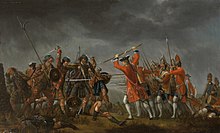Clan
| Part ofa serieson the |
| Anthropology ofkinship |
|---|
 |
|
Social anthropology Cultural anthropology |
Aclanis a group of people united byactualorperceivedkinship[1] anddescent.Even if lineage details are unknown, a clan may claim descent from a founding member orapical ancestorwho serves as a symbol of the clan's unity. Clans, in indigenous societies, were notendogamous:their members could not marry one another.
Clans preceded[citation needed]more centralized forms of community organization and government, and have existed in every country.[citation needed]Members may identify with acoat of armsor other symbol.
Etymology[edit]
The English word "clan" is derived from old Irishclann[1]meaning "children", "offspring", "progeny" or "descendants"; it is not from the word for "family" or "clan" in eitherIrish[2][3]or Scottish Gaelic. According to theOxford English Dictionary,the word "clan" was introduced into English in around 1425, as a descriptive label for the organization of society in Ireland and theScottish Highlands.[4]
None of the Irish and Scottish Gaelic terms for kinship groups is cognate to Englishclan;Scottish Gaelicclannmeans "children":
- fine[ˈfʲɪnʲə]means (English) "clan"
- teaghlachmeans "family" in the sense of the nuclear family, or can include more distant relatives living in the same house
- líon tímeans either "family" in the sense of "household", or everyone who lives in the house, including non-relatives
- muintirmeans "family" in the broad sense of "kinsfolk"[3]
Clans as political units[edit]
In different cultures and situations, a clan usually has different meaning than other kin-based groups, such astribesandbands.Often, the distinguishing factor is that a clan is a smaller, integral part of a largersocietysuch as atribe,chiefdom,or astate.In some societies, clans may have an official leader such as achief,matriarchorpatriarch;or such leadership role is performed by elders. In others, leadership positions may have to be achieved.
Examples includeIrish,Scottish,Chinese,Korean,andJapanese clans,which exist as distinct social groupings within their respective nations. Note, however, that tribes and bands can also be components of larger societies. The earlyNorse clans,theætter,are often translated as "house" or "line". The Biblicaltribesof Israel were composed of many clans.[5]Arab clansare sub-tribal groups within Arab society. Native American andFirst Nationspeoples, often referred to as "tribes", also have clans. For instance,Ojibwabands are smaller parts of theOjibwa peopleor tribe inNorth America.The many Native American peoples are distinguished by language and culture, and most have clans and bands as the basic kinship organizations. In some cases tribes recognized each other's clans; for instance, both theChickasawandChoctawtribes of the Southeast United States had fox and bear clans, who felt a kinship that reached beyond their respective tribes.
Apart from these different historical traditions of kinship, conceptual confusion arises from colloquial usages of the term. In post-Sovietcountries, for example, it is quite common to speak of "clans" in reference to informal networks within the economic and political sphere. This usage reflects the assumption that their members act towards each other in a particularly close and mutually supportive way, approximating the solidarity among kinsmen. Similar usage of the term applies to specific groups of various cultures and nationalities involved in organizedcrime.Polishclans differ from most others as they are a collection offamilieswho bear the samecoat of arms,as opposed to claiming a common descent (seePolish heraldry). There are multiple closely related clans in theIndian subcontinent,especiallySouth India.
Romani peoplehave many clans which are called vitsa in Romani.
Scottish Clans[edit]
Scottish clans are social groupings that have played a pivotal role in the history and culture of Scotland. Unlike some other clans that focus solely on common descent or a shared coat of arms, Scottish clans are unique in their elaborate systems of tartans, insignias, and mottos. Clan culture in Scotland also extends to community events such as clan gatherings and Highland Games. Each clan may have an official leader known as a "Chieftain" or "Chief."
Members of Scottish clans often have a shared interest in preserving their historical and cultural landmarks, as well as the natural environment and wildlife of Scotland. The clan system in Scotland has also been influenced by key historical events like the Highland Clearances and the Jacobite uprisings, which have left lasting impacts on clan structures and Scottish diaspora.[6]
Clannism[edit]
Clannism(in Somali culture,qabiilism)[7]is a system of society based on clan affiliation.[8]
TheIslamic world,theNear East,Northand theHorn of Africain general, andSomali culturespecifically, ispatriarchal[9]and traditionally centered onpatrilinealclans or tribes.[10]
Clans by continent or region[edit]

| Africa | |
| Americas |
|
| Asia |
|
| South Asia |
|
| Middle East |
|
| Eurasiaa |
|
| Europe |
|
| Oceania |
|
aMeaning thetranscontinentalarea between Asia and Europe.
See also[edit]
References[edit]
- ^ab Chisholm, Hugh,ed. (1911)..Encyclopædia Britannica.Vol. 6 (11th ed.). Cambridge University Press. pp. 419–421.
- ^Dineen, Patrick S. (1927).Foclóir Gaeďilge agus Béarla[Dictionary of Irish and English]. Dublin and Cork, Ireland: The Educational Company of Ireland.
- ^abÓ Dónaill, Niall (1992).Foclóir Gaeilge–Béarla[Irish–English Dictionary]. Dublin, Ireland: An Gúm.ISBN1-85791-037-0.
- ^"Clan".Online Etymology Dictionary.
- ^See, for example,1 Chronicles4 andNumbers26 in the Old Testament.
- ^"The Unique Features and History of Scottish Clans".CLAN.com.2023-09-29.Retrieved2023-09-29.
- ^Farah, Abdulkadir Osman (25 October 2012).Transnationalism And Civic Engagement.Adonis & Abbey Publishers. p. 25.ISBN9781912234776.
- ^Banana, Canaan (1996).The church in the struggle for Zimbabwe.p. 41.
- ^Asuelime, Lucky (2014).Selected Themes in African Political Studies: Political Conflict and Stability.Springer. p.15.ISBN978-3-319-06001-9.
- ^Warah, Rasna (2014).Selected Themes in African Political Studies: Political Conflict and Stability.p. 45.
